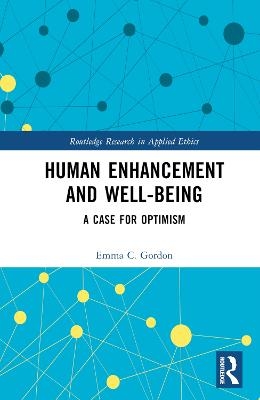
Human Enhancement and Well-Being
A Case for Optimism
Seiten
2022
Routledge (Verlag)
978-0-367-70220-5 (ISBN)
Routledge (Verlag)
978-0-367-70220-5 (ISBN)
This book outlines and criticises the six main contemporary arguments for scepticism about the role of human enhancements in promoting well-being. It also defends important and concrete ways in which enhancement-permissive policies should be embraced with the aim of promoting well-being.
New technologies and medicines make it increasingly possible to enhance human functioning in new ways: to become smarter, more emotionally attuned, and perhaps even morally better. But just because we can use the latest science to improve ourselves, should we?
This book has two main aims. First, it outlines and criticises the six main contemporary arguments for scepticism about the role of human enhancements in promoting well-being. These arguments concern, respectively, (i) the value of achievements, (ii) freedom, (iii) hyperagency, (iv) human nature, (v) authenticity, and (vi) inequality. It will be shown – for the first time in a book-length treatment – why the overarching bioconservative case against enhancement doesn’t hold water. The second central aim of the book is positive; as we’ll see, each of the bioconservative critiques considered and rejected will be shown to nonetheless motivate a distinctive kind of theoretical desideratum that a viable positive enhancement proposal should satisfy. The remainder of the book then defends a two-part enhancement proposal that will be shown to clearly satisfy the theoretical desiderata that emerged from reflecting on the earlier critique of bioconservativism. The first part of the positive proposal motivates and outlines the general role of an enhancement counsellor in facilitating voluntary enhancement; I then offer an applied case study of this role in the special case of enhancement for the purpose of facilitating romantic and parental relationships.
Human Enhancement and Well-Being: A Case for Optimism will be of interest to scholars and advanced students working in applied ethics, bioethics, philosophy of technology, philosophy of well-being, and social epistemology.
New technologies and medicines make it increasingly possible to enhance human functioning in new ways: to become smarter, more emotionally attuned, and perhaps even morally better. But just because we can use the latest science to improve ourselves, should we?
This book has two main aims. First, it outlines and criticises the six main contemporary arguments for scepticism about the role of human enhancements in promoting well-being. These arguments concern, respectively, (i) the value of achievements, (ii) freedom, (iii) hyperagency, (iv) human nature, (v) authenticity, and (vi) inequality. It will be shown – for the first time in a book-length treatment – why the overarching bioconservative case against enhancement doesn’t hold water. The second central aim of the book is positive; as we’ll see, each of the bioconservative critiques considered and rejected will be shown to nonetheless motivate a distinctive kind of theoretical desideratum that a viable positive enhancement proposal should satisfy. The remainder of the book then defends a two-part enhancement proposal that will be shown to clearly satisfy the theoretical desiderata that emerged from reflecting on the earlier critique of bioconservativism. The first part of the positive proposal motivates and outlines the general role of an enhancement counsellor in facilitating voluntary enhancement; I then offer an applied case study of this role in the special case of enhancement for the purpose of facilitating romantic and parental relationships.
Human Enhancement and Well-Being: A Case for Optimism will be of interest to scholars and advanced students working in applied ethics, bioethics, philosophy of technology, philosophy of well-being, and social epistemology.
Emma C. Gordon is a Lecturer in Applied Ethics at the University of Glasgow, UK. Her expertise is mainly in applied ethics (especially bioethics) and social epistemology. Her work has appeared in such places as Ethical Theory and Moral Practice, Bioethics, The Journal of Applied Philosophy, Neuroethics, and Philosophical Psychology.
1. Introduction
2. The Case for Bioconservativism I: Achievement, Freedom, and Hyperagency
3. The Case for Bioconservativism II: Human Nature, Authenticity, and Inequality
4. Key Desiderata, Constraints, Methods
5. Facilitating Enhancement: The Central Role of Counselling
6. Enhancement in Practice: Loving Relationships
| Erscheinungsdatum | 19.12.2022 |
|---|---|
| Reihe/Serie | Routledge Research in Applied Ethics |
| Verlagsort | London |
| Sprache | englisch |
| Maße | 152 x 229 mm |
| Gewicht | 331 g |
| Themenwelt | Geisteswissenschaften ► Geschichte |
| Geisteswissenschaften ► Philosophie ► Erkenntnistheorie / Wissenschaftstheorie | |
| Geisteswissenschaften ► Philosophie ► Ethik | |
| Sozialwissenschaften ► Soziologie ► Allgemeines / Lexika | |
| ISBN-10 | 0-367-70220-7 / 0367702207 |
| ISBN-13 | 978-0-367-70220-5 / 9780367702205 |
| Zustand | Neuware |
| Haben Sie eine Frage zum Produkt? |
Mehr entdecken
aus dem Bereich
aus dem Bereich
die Grundlegung der modernen Philosophie
Buch | Softcover (2023)
C.H.Beck (Verlag)
18,00 €
Buch | Softcover (2023)
Reclam, Philipp (Verlag)
7,00 €

![Was heißt Denken?. Vorlesung Wintersemester 1951/52. [Was bedeutet das alles?] - Martin Heidegger](/media/113619842)
